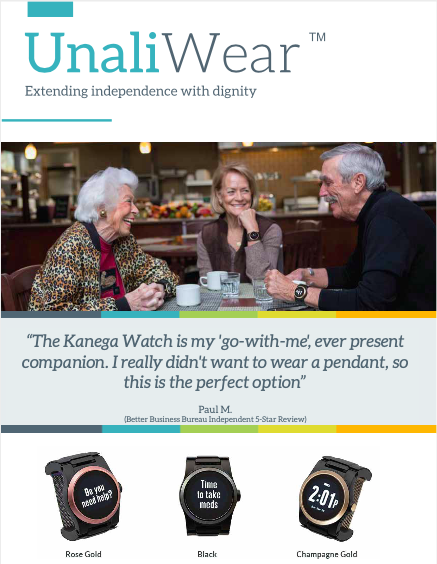Choosing the Best Fall Detection Device
Medical alert and fall detection devices have come a long way in recent years. Portable choices were once few and far between, or seniors were stuck with unsightly and stigmatizing pendants.
Today, modern fall detection and medical alert technologies have advanced and there are more choices. There’s a downside to this, though: with all the new options on the market, it can be harder to pinpoint the devices that are actually fit for purpose.
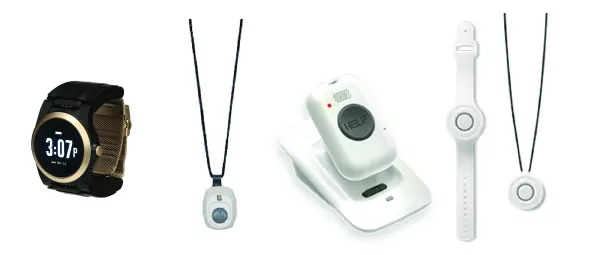
For example, as big-name brands such as Fitbit, Samsung and Apple realized there was a market for fall detection functionalities, many started adding this technology to their current offerings.
This approach certainly widens the audience these companies can target. But unfortunately, these health-adjacent tools aren’t the best option available when you’re looking for a dedicated fall detection and medical alert device.
If your focus is ensuring the very best emergency response in the event of a fall (or personal emergency), you’re better served by a device that’s simple to set up, simple to use, and features top-of-the-line technology with a proven performance you know you can count on.
At the same time, you want a device that looks and feels like a watch. Most seniors and people with certain medical conditions found older fall detection devices clunky and uncomfortable, and left them looking (or feeling) frail or old.
Here’s what to look for when choosing a fall detection device:
The Best Fall Detection Devices Have a Dedicated Purpose
When new technologies are introduced, it’s usually to make things simpler or more convenient. Like the health-adjacent devices mentioned above, this often means creating a single piece of equipment that can replace multiple pieces of technology: for instance, a tablet with the functionality of a laptop, or a watch that can text, track your exercise, and keep the time. Having that single, new piece of equipment can substitute for multiple pieces that suddenly feel outdated.
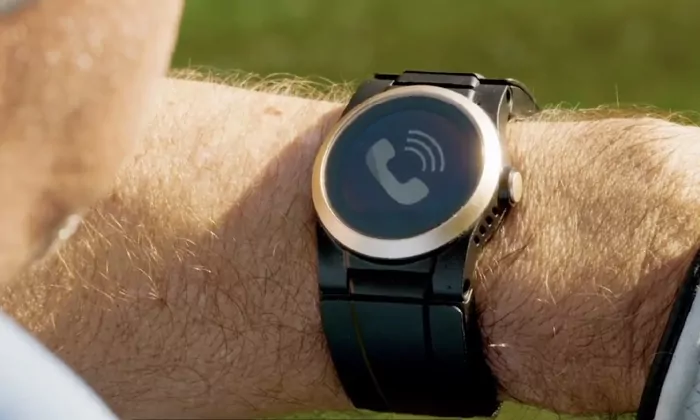
While this may sound good in theory, this approach can lead to devices that don’t always perform each task as well as one that’s built and intended for a single purpose. Like a Jack-of-all-trades, these multi-purpose pieces can do a little bit of everything — but they don’t stand out as exceptional at any one thing.
When you’re relying on a medical or personal emergency alert device to keep you safe, you don’t want to settle for an all-purpose device. Instead, turn to a purpose-built product like the Kanega Watch where fall detection is its primary function.
Not only is the Kanega Watch specifically designed to excel at its task, but it’s also a trailblazer in its industry as the first voice-activated, all-in-one medical alert watch.
The Best Fall Detection Devices are Incredibly Easy to Use
Ever tried to set up an Apple or Samsung smartwatch? It can take days to get all the features set and the wearer’s preferences in order, and that’s without trying to find and activate the fall-detection function.
Too many features get in the way, and too many features are not ideal for people who need a reliable fall detection device. Unlike most health-adjacent wearables, the Kanega Watch is already fully set up when you receive it. It starts protecting you the second it is taken out of the box. There’s no extensive manual to read or complicated options to consider — it just works.
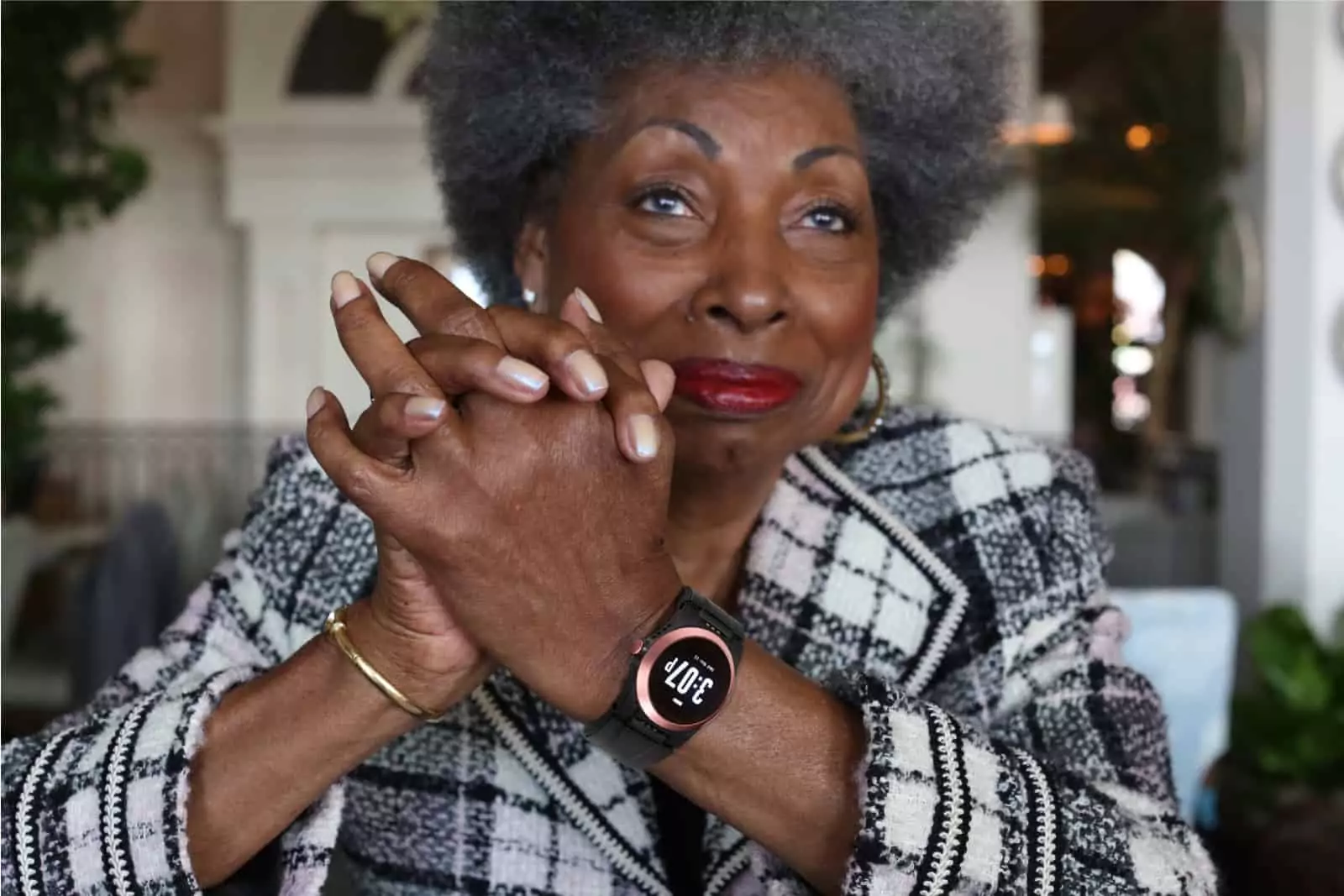
There’s zero learning curve involved, just charge the batteries, put the batteries in the watch and you’re protected. The Kanega Watch even talks people through its unique on-watch tutorial to get wearers comfortable.
Thoughtful, focused design matters, especially for seniors and other vulnerable populations, and that’s what the Kanega Watch offers.
The Best Fall Detection Devices Empower the Wearer
No one wants to draw unnecessary attention to age or medical needs. Some seniors may even resist wearing a safety device if they feel like it identifies them as frail or incapable.
Traditional unsightly and highly visible medical alert devices can be unappealing to those who need them most — it’s little wonder so many seniors choose not to use them!
A great fall detection device is one the target audience looks forward to wearing. After all, if a fall detection device is not being worn, it can’t do its job.
A watch is a perfect option for seniors who should have quick access to help in a medical emergency, but who also want to retain their sense of self-sufficiency and dignity.
With the look and feel of a traditional watch, anyone can wear a fall detection device like the Kanega Watch without feeling exposed or embarrassed. Its streamlined looks are visually appealing and the easy-to-read face features large white letters on a black background.
The Best Fall Detection Devices Offer 24/7 Protection
Falls can happen at any time. Whether it’s a late-night trip to the restroom or an early morning walk to get the paper, 24/7 monitoring and connection to a dedicated monitoring service is critical when choosing a fall detection device.
Of course, having a 24/7 connection to a monitoring service is only useful if the fall detection device is worn 24/7.
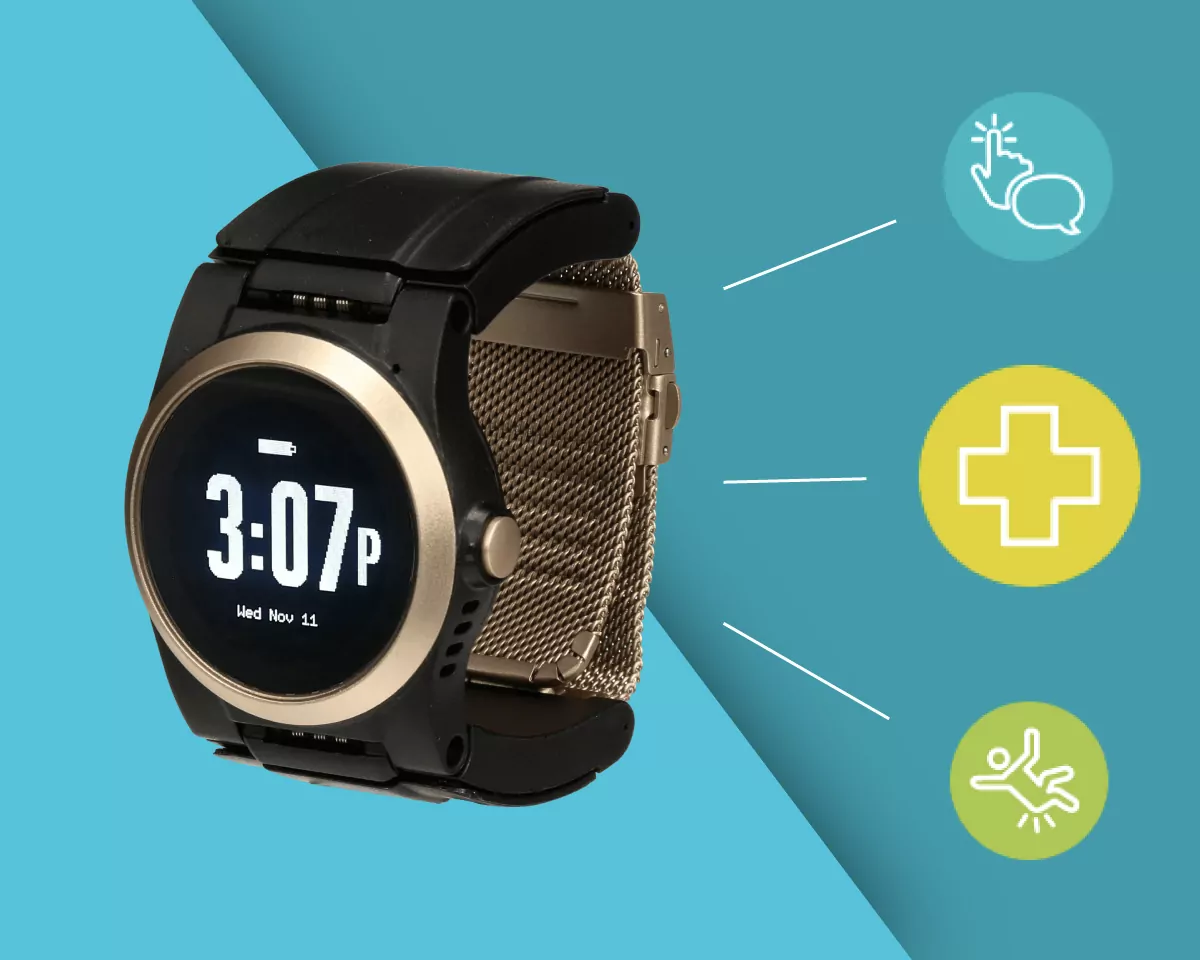
The Kanega Watch:
- Is a wrist-worn fall detection device
- Never has to be taken off to charge
- Connects to both Wi-Fi and cellular data
- Offers round the clock connection to monitoring services
Because wearers can wear their Kanega Watch 24/7, they get the full protection the monitoring service provides.
And unlike the Apple Watch and comparable products (which connect only to 911 in an emergency, not a monitoring service), the Kanega Watch agents immediately have access to the wearer’s personal info and can assess the situation accordingly.
These agents can do things that 911 can’t, such as call a family member for help. Like 911, Kanega Watch agents can directly and promptly dispatch EMTs in an emergency to the wearer’s GPS location. However, Kanega Watch agents can go further and do what 911 can’t, like give EMTs essential information such as if the wearer has high blood pressure, an allergy to certain medications, or the combination of the lockbox, so there’s no time wasted breaking down the door to provide help.
Traditional medical alert pendants are reliant on cellular connection, and in many homes,‘dead zones’ represent a challenge. This isn’t an issue with the Kanega Watch, as Wi-Fi ensures a reliable connection at home — Kanega is the only device offering this benefit in the medical alert and fall detection industry.
Plus, UnaliWear configures each Kanega Watch to the wearer’s home Wi-Fi network, meaning it connects and the wearer is protected as soon as it’s out of the box.
The Best Fall Detection Devices are Built for Real Life
You choose a medical alert device because you or your loved one are looking to lead the same, full life you or your loved one has been enjoying.
You want a device that’s hardy enough to join you no matter the activity, whether that’s a walk through the rain or doing the dishes.
You also don’t want the wearer to feel like their daily routine is being changed or compromised. For instance, a common place for falls for seniors is in the bathroom. A waterproof device like the Kanega Watch doesn’t need to be removed during showers. This keeps seniors or the medically vulnerable safe while also giving them back their independence.

UnaliWear also knows real life takes place outside of the confines of home. Since maintaining independence is the point of investing in a fall detection device, it’s important that the device you choose works even when the wearer is leaving home.
With this in mind, the Kanega Watch automatically connects to the Verizon cellular service upon leaving the wearer’s home Wi-Fi range.
In addition, if the wearer has multiple locations where they live or visit, the Kanega Watch can be programmed to automatically connect to up to seven different Wi-Fi locations — providing unmatched call quality and coverage.
The Best Fall Detection Device Provides Multiple Ways to Get Help
The reality is that unexpected falls can happen for a variety of reasons. When a person falls, they may not be able to ask for help. Some devices on the market can connect you to emergency services — but only if you initiate the request.
Whether you’re concerned about an unexpected change in blood sugar or a senior who’s been badly hurt in a fall, the best fall detection devices connect automatically to emergency services.
Unlike other fall detection devices, the Kanega Watch offers multiple ways to get help, including a voice-activated connection to 24/7 monitoring services. This is invaluable during moments where a wearer feels like they’re in need of immediate help but cannot push the emergency alert button themselves.
The Best Fall Detection Devices Don’t Rely on Other Devices
Those fall detection devices that tie into a cell phone or existing cell phone plan can seem appealing — again, because they promise ease of use and fit in well with the devices you already own.
However, if your fall detection device relies on a cell phone to work, the wearer has to have the phone on them at all times. For many who are at high risk for falls, their cell phones serve the primary function of placing calls.
This means cell phones are often left on a charger in a dedicated location until they’re needed and aren’t being carried around during daily tasks. As a result, a trip out to get mail or to a bathroom, where reception is limited, can quickly lead to a problem if there’s an accident and the fall detection device is out of range of its cell phone.
The Kanega Watch, on the other hand, is a self-contained fall-detection device. It does not rely on any other devices or services to do its job, which means you can always be assured you have access to those emergency services when they’re needed most.
The Best Fall Detection Devices Work Round the Clock
Fall detection devices can only work if they’re being worn. Other devices need to be removed to recharge. The result is the device’s wearer may be up and about during the day while their device is charging.
Or, the wearer may choose to charge their device overnight while they sleep. This can lead to a situation where a late-night trip to the restroom results in a fall and the very device that’s supposed to help them isn’t able to do so.
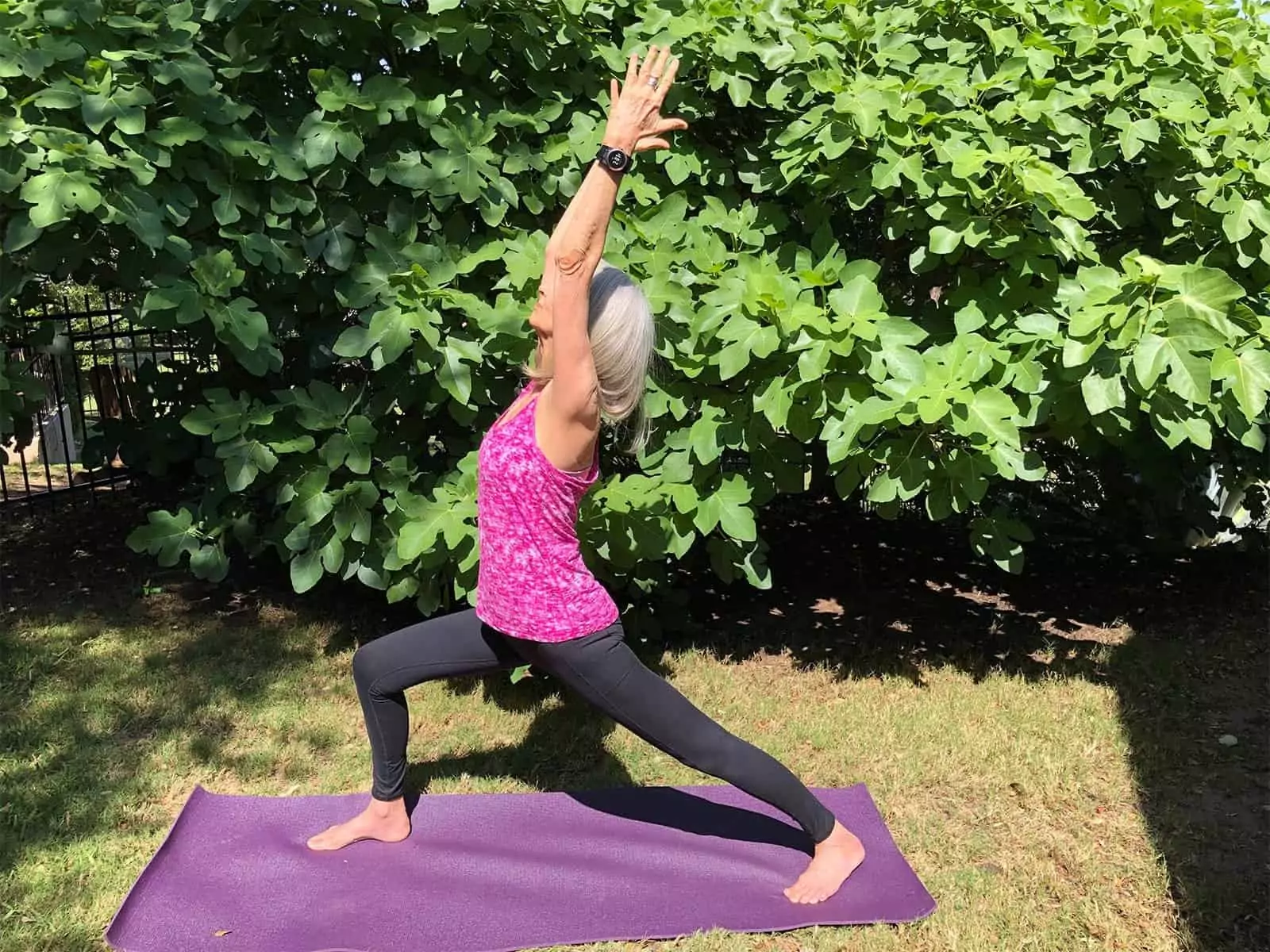
Unlike other fall detection devices, the Kanega Watch doesn’t need to be removed to charge. Not only is the battery life long-lasting — partly because it isn’t trying to multitask like other devices — it can also be charged while it remains on your wrist. The simple charging system involves clipping battery cells to the Kanega Watch to recharge when needed (every one to two days), all without risking an unmonitored fall.
It’s a far cry from traditional fall detection pendants, most of which have to be taken off at night (when people need protection the most) so the wearer doesn’t become entangled, or woken up needlessly when the pendant presses against their chest. Or worse, accidentally sets off the fall alert — try getting back to sleep after that!
Don’t Settle for Second Best When it Comes to Your Fall Detection Device
It’s true that there are a lot of options these days when it comes to fall detection devices. But the Kanega Watch’s superior performance is undeniable and it hasn’t gone unnoticed. This dedicated fall-detection and medical alert device has won numerous accolades and awards, including Best IoT Device at the VOICE Summit in 2019.
If you’re ready to have a device you can truly rely on — without the stigma that accompanies other fall detection devices — you can try the Kanega Watch today, risk-free.
Each watch comes with a 30-day trial period. If it’s just not the right option for you, it can be returned and you’ll be given a full refund, no questions asked. There’s no contract to sign or commitment, either. Simply return the watch and that’s it.
With nothing to lose, there’s no reason not to see how a Kanega Watch can work for you. Order yours today.
360 VIEW
Click and drag on image to spin
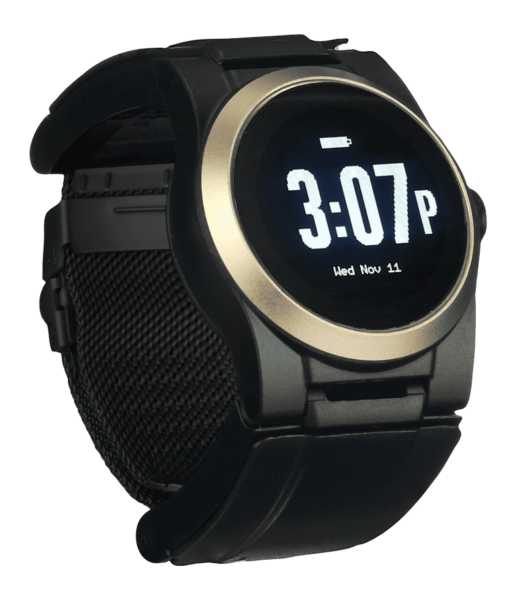
Meet the
Kanega Watch
(learn more)

